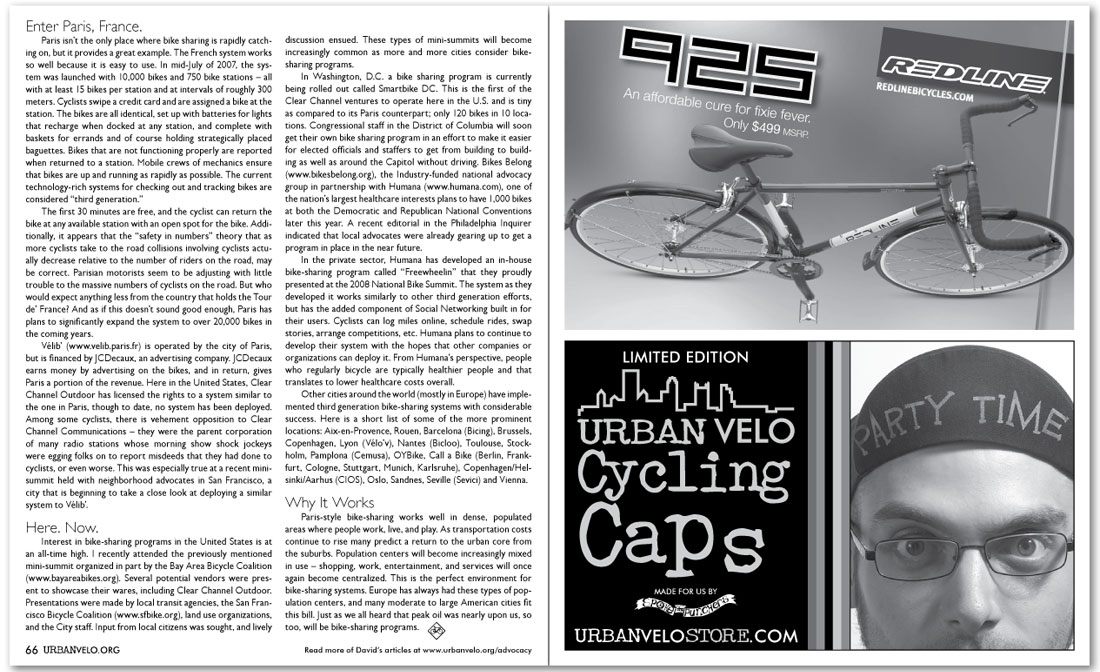Enter Paris, France.
Paris isn’t the only place where bike sharing is rapidly catching on, but it provides a great example. The French system works so well because it is easy to use. In mid-July of 2007, the system was launched with 10,000 bikes and 750 bike stations – all with at least 15 bikes per station and at intervals of roughly 300 meters. Cyclists swipe a credit card and are assigned a bike at the station. The bikes are all identical, set up with batteries for lights that recharge when docked at any station, and complete with baskets for errands and of course holding strategically placed baguettes. Bikes that are not functioning properly are reported when returned to a station. Mobile crews of mechanics ensure that bikes are up and running as rapidly as possible. The current technology-rich systems for checking out and tracking bikes are considered “third generation.”
The first 30 minutes are free, and the cyclist can return the bike at any available station with an open spot for the bike. Additionally, it appears that the “safety in numbers” theory that as more cyclists take to the road collisions involving cyclists actually decrease relative to the number of riders on the road, may be correct. Parisian motorists seem to be adjusting with little trouble to the massive numbers of cyclists on the road. But who would expect anything less from the country that holds the Tour de’ France? And as if this doesn’t sound good enough, Paris has plans to significantly expand the system to over 20,000 bikes in the coming years.
Vélib’ (www.velib.paris.fr) is operated by the city of Paris, but is financed by JCDecaux, an advertising company. JCDecaux earns money by advertising on the bikes, and in return, gives Paris a portion of the revenue. Here in the United States, Clear Channel Outdoor has licensed the rights to a system similar to the one in Paris, though to date, no system has been deployed. Among some cyclists, there is vehement opposition to Clear Channel Communications – they were the parent corporation of many radio stations whose morning show shock jockeys were egging folks on to report misdeeds that they had done to cyclists, or even worse. This was especially true at a recent mini-summit held with neighborhood advocates in San Francisco, a city that is beginning to take a close look at deploying a similar system to Vélib’.
Here. Now.
Interest in bike-sharing programs in the United States is at an all-time high. I recently attended the previously mentioned mini-summit organized in part by the Bay Area Bicycle Coalition (www.bayareabikes.org). Several potential vendors were present to showcase their wares, including Clear Channel Outdoor. Presentations were made by local transit agencies, the San Francisco Bicycle Coalition (www.sfbike.org), land use organizations, and the City staff. Input from local citizens was sought, and lively discussion ensued. These types of mini-summits will become increasingly common as more and more cities consider bike-sharing programs.
In Washington, D.C. a bike sharing program is currently being rolled out called Smartbike DC. This is the first of the Clear Channel ventures to operate here in the U.S. and is tiny as compared to its Paris counterpart; only 120 bikes in 10 locations. Congressional staff in the District of Columbia will soon get their own bike sharing program in an effort to make it easier for elected officials and staffers to get from building to building as well as around the Capitol without driving. Bikes Belong (www.bikesbelong.org), the Industry-funded national advocacy group in partnership with Humana (www.humana.com), one of the nation’s largest healthcare interests plans to have 1,000 bikes at both the Democratic and Republican National Conventions later this year. A recent editorial in the Philadelphia Inquirer indicated that local advocates were already gearing up to get a program in place in the near future.
In the private sector, Humana has developed an in-house bike-sharing program called “Freewheelin” that they proudly presented at the 2008 National Bike Summit. The system as they developed it works similarly to other third generation efforts, but has the added component of Social Networking built in for their users. Cyclists can log miles online, schedule rides, swap stories, arrange competitions, etc. Humana plans to continue to develop their system with the hopes that other companies or organizations can deploy it. From Humana’s perspective, people who regularly bicycle are typically healthier people and that translates to lower healthcare costs overall.
Other cities around the world (mostly in Europe) have implemented third generation bike-sharing systems with considerable success. Here is a short list of some of the more prominent locations: Aix-en-Provence, Rouen, Barcelona (Bicing), Brussels, Copenhagen, Lyon (Vélo’v), Nantes (Bicloo), Toulouse, Stockholm, Pamplona (Cemusa), OYBike, Call a Bike (Berlin, Frankfurt, Cologne, Stuttgart, Munich, Karlsruhe),Copenhagen/Helsinki/Aarhus (CIOS), Oslo, Sandnes, Seville (Sevici) and Vienna.
Why It Works
Paris-style bike-sharing works well in dense, populated areas where people work, live, and play. As transportation costs continue to rise many predict a return to the urban core from the suburbs. Population centers will become increasingly mixed in use – shopping, work, entertainment, and services will once again become centralized. This is the perfect environment for bike-sharing systems. Europe has always had these types of population centers, and many moderate to large American cities fit this bill. Just as we all heard that peak oil was nearly upon us, so too, will be bike-sharing programs.
Read more of David’s articles at www.urbanvelo.org/advocacy
